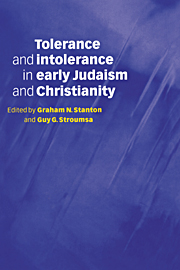Book contents
- Frontmatter
- Contents
- List of contributors
- List of abbreviations
- Introduction
- 1 Intolerance and martyrdom: from Socrates to Rabbi ‘Aqiva
- 2 The other in 1 and 2 Maccabees
- 3 The pursuit of the millennium in early Judaism
- 4 Conservative revolution? The intolerant innovations of Qumran
- 5 Who was considered an apostate in the Jewish Diaspora?
- 6 Why did Paul persecute the church?
- 7 Paul and the limits of tolerance
- 8 Philo's views on paganism
- 9 Coexisting with the enemy: Jews and pagans in the Mishnah
- 10 Tertullian on idolatry and the limits of tolerance
- 11 The threefold Christian anti-Judaism
- 12 The intertextual polemic of the Markan vineyard parable
- 13 Jews and Jewish Christians in the land of Israel at the time of the Bar Kochba war, with special reference to the Apocalypse of Peter
- 14 The Nazoreans: living at the boundary of Judaism and Christianity
- 15 Justin Martyr's Dialogue with Trypho: group boundaries, ‘proselytes’ and ‘God-fearers’
- 16 Accusations of Jewish persecution in early Christian sources, with particular reference to Justin Martyr and the Martyrdom of Polycarp
- 17 Early Christians on synagogue prayer and imprecation
- 18 Messianism, Torah and early Christian tradition
- 19 Jewish and Christian public ethics in the early Roman Empire
- Postscript: the future of intolerance
- General bibliography
- Index
Postscript: the future of intolerance
Published online by Cambridge University Press: 08 March 2010
- Frontmatter
- Contents
- List of contributors
- List of abbreviations
- Introduction
- 1 Intolerance and martyrdom: from Socrates to Rabbi ‘Aqiva
- 2 The other in 1 and 2 Maccabees
- 3 The pursuit of the millennium in early Judaism
- 4 Conservative revolution? The intolerant innovations of Qumran
- 5 Who was considered an apostate in the Jewish Diaspora?
- 6 Why did Paul persecute the church?
- 7 Paul and the limits of tolerance
- 8 Philo's views on paganism
- 9 Coexisting with the enemy: Jews and pagans in the Mishnah
- 10 Tertullian on idolatry and the limits of tolerance
- 11 The threefold Christian anti-Judaism
- 12 The intertextual polemic of the Markan vineyard parable
- 13 Jews and Jewish Christians in the land of Israel at the time of the Bar Kochba war, with special reference to the Apocalypse of Peter
- 14 The Nazoreans: living at the boundary of Judaism and Christianity
- 15 Justin Martyr's Dialogue with Trypho: group boundaries, ‘proselytes’ and ‘God-fearers’
- 16 Accusations of Jewish persecution in early Christian sources, with particular reference to Justin Martyr and the Martyrdom of Polycarp
- 17 Early Christians on synagogue prayer and imprecation
- 18 Messianism, Torah and early Christian tradition
- 19 Jewish and Christian public ethics in the early Roman Empire
- Postscript: the future of intolerance
- General bibliography
- Index
Summary
The chapters in this volume approach from various angles the different but related problems of identity and its boundaries, sectarianism, persecution, coexistence and Kulturkampf among Jews and Christians, in the Hellenistic world and under the early Empire. This was a world of competing and conflicting identities. Ethnic and religious groups, living in many ways according to similar life patterns, were at the same time involved in deep, even radical, arguments with one another (and among themselves) about religious truth and error, and about the components of their own identity versus outsiders of all sorts.
These chapters do not offer an overarching thesis or grand theory on religious tolerance and intolerance in ancient monotheistic religions. Since Edward Gibbon – perhaps even since Julian the Apostate – it has often been claimed that religious intolerance lies in the very nature of monotheism: to one single God corresponds one single truth, while all other views of the divinity reflect intellectual and moral error, and end in idolatry. The simplistic character of such a position has often been submitted to sharp criticism: polytheistic religions, too, could show clear signs of intolerance, while in many ways Christian and Jewish patterns of thought and behaviour reflected a tolerant attitude vis-a-vis outsiders. The purpose of this book is neither to refute nor to substantiate what can be called the neo-pagan conception of an inherent monotheistic intolerance.
- Type
- Chapter
- Information
- Tolerance and Intolerance in Early Judaism and Christianity , pp. 356 - 361Publisher: Cambridge University PressPrint publication year: 1998
- 2
- Cited by

